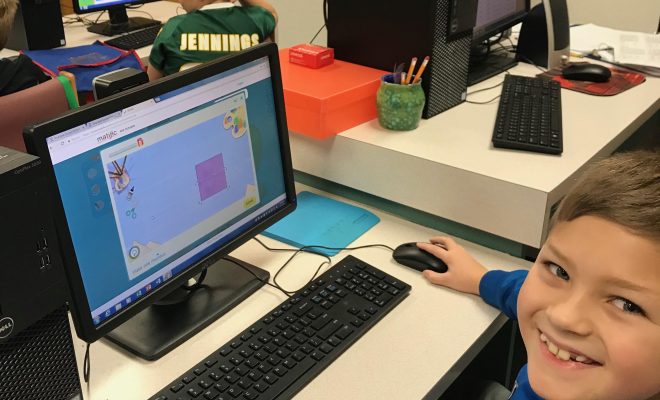3 Benefits of Gamifying Math Lessons

A K-12 math coach shares how games deliver differentiated instruction, formative assessment, and fun.
By Kelly Schaefer
It’s no secret that kids love games. Students can sit for hours on end harvesting virtual crops, fitting puzzle blocks together, or battling space monsters. For years now, educators have been trying to incorporate more gamification into their lessons to encourage critical thinking skills and keep students motivated when learning a challenging skill. Math is the perfect subject to incorporate games into, since both math and games involve solving a problem to reach a goal. Here are three advantages our elementary school has seen from gamifying our math curriculum.
1) Differentiating Instruction
I teach 5th-grade math, and I’m also a math coach for kindergarten through 12th grade, so I do interventions for kids who are struggling, and I coach teachers on how to accomplish their goals for the year. One of the first things I did as a math coach in the Riverdale Elementary building was to go into classrooms and observe. Most of our teaching was being done in whole groups at that time, and the most striking thing I saw in every classroom was a group of kids who were not especially challenged while the teacher was going over something that they already knew. There was also always a handful of kids who were looking lost. Then there was a smaller group in the middle that the instruction was at the right level for. These teachers were making good lesson plans and had interesting activities, but there was still something missing.
For years, Riverdale has done small-group teaching in reading, which research from the National Reading Panel says is the most effective way to ensure that students are getting what they need. We wanted to apply this same principle to our math classrooms, but we lacked worthwhile supplemental materials for kids to use when the teacher was instructing other groups. Our goal was to find something that would make teachers say, “My kids like this. They’re engaged, they’re not interrupting me when I’m in my guided group, and they’re still learning something that’s worthwhile.”
In order to take this big step toward achieving the results we wanted our teachers to attain in small, guided group instruction, we decided to purchase the interactive online games from Matific. Students would be able to use the games to strengthen what the teachers were teaching in small-group instruction. Teachers would then be able to teach without interruption during that guarded, guided group time.
The first year, we just assigned the games by grade level and said, “Have at it,” but now we’ve gotten more specific about coordinating the game assignments with our textbook lessons. Then we look at our data to see where we need to go from that point. We can differentiate what skills students are assigned. For example, we have a 4th-grader right now who the lessons were all very quick and easy for, so after reviewing the data, the teacher and I bumped her up a level and assigned her some games that we thought would be more challenging.
2) Increasing Student Engagement
Gamification allows students to work at their own pace and be at the right level for their individual abilities, which makes a big difference in their motivation. One of the things that I try to instill in our district is the idea that everybody can do math. We talk a lot about how our brains grow and about having a growth mindset. I feel like we have a pretty good thing going, that the kids feel like math is fun. These games are definitely built so that they can experience success.
The kids really like it, too. Whereas before they might have said, “I have to go do my math,” now they say, “I get to go play games.” Our program is also set up so they can play at home. Not everybody has internet in our district, so we don’t require anyone to play at home, but a lot of kids do it for fun, including my own son and nephews. I’ll have other students come and tell me that they made it all the way through a certain path at home. These paths are not completed without challenge, either. I see some students working on game in school and really having to think it out. The sense of achievement has also grown in our students. Many used to tell me, “This is really hard,” now they tell me, with a smile on their face, “It was really hard, but I did it!”
As part of our ongoing mission to get students excited about math, we’re also participating in the Matific Math Games Challenge this month. Our students are eager to take the challenge, where Riverdale has the chance to win $15,000 cash. It’s giving them even more motivation to practice, because they want to help win money for their school.
3) Assisting in Assessment
Part of my role as math coach is to organize progress monitoring of our students so we can figure out exactly what each student needs and how best to support them. The first step in this process is gathering useful data, and our game platform has a reporting feature that shows how students do on all the games, including how long it takes them and how many times they tried an activity. Sometimes I look at that to see if the level they are at is too easy for them. I also correlate their unit test scores to the Matific data. We look at the data at the end of each unit, and share a spreadsheet where the teachers can make notes of where kids still need interventions based on their tests, or certain skills that they need to be practiced more (such as how to count back change from a dollar). I can then assign games based on these results. The games are also helpful as a type of formative assessment, helping us to see where kids are so we can adjust their curriculum accordingly.
With games, kids are learning math skills at their own pace, and also of their own initiative. It’s a great way for teachers to assign independent practice that kids can really get excited about. The hands-on, problem-solving nature of games prepares students to take these skills into the real world. Not only that, but games afford students space to make mistakes in a low-stakes arena. If they miss an answer on a game, it’s not as big a deal as if they missed one in their homework or on a test. With a game they can try again, and they want to try again. They want to beat their score and improve. Overall, we’ve found that games can help encourage students to embrace a growth mindset and to discover the fun of learning.
Kelly Schaefer teaches 5th-grade math at Riverdale Elementary in Muscoda, WI. She also serves as the K–12 math coach for the Riverdale School District.






